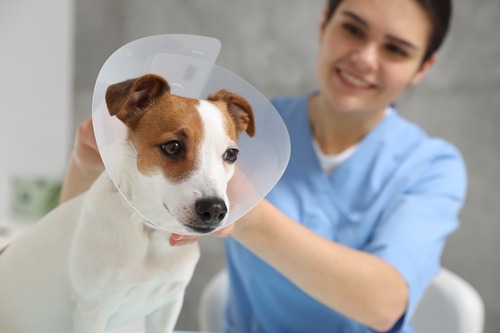Making the decision to neuter your dog is one of the most significant choices you’ll make as a pet parent. Beyond simply managing the pet population, neutering has several potential benefits for your dog’s health and behavior. However, it’s also a procedure that requires thoughtful consideration. This blog provides essential information about dog neutering, from the procedure itself to the benefits and recovery process. Whether you’re new to pet ownership or simply want to make an informed decision, we’ll aim to give you a clear understanding of what neutering entails. For more information or to schedule an appointment, please call Veterinary Medical Center of Easton at (410) 822-8505 today!
What is Dog Neutering?
Dog neutering, or castration, is a surgical procedure that involves the removal of a male dog’s testicles. This procedure eliminates the dog’s ability to reproduce and typically reduces certain behaviors driven by male hormones, like roaming or marking. Neutering is performed by a licensed veterinarian and requires your dog to undergo anesthesia to ensure they are pain-free throughout the surgery.
How Neutering Works
During the neutering procedure, your dog will be placed under general anesthesia to ensure they’re comfortable and unaware of the surgery. Your veterinarian makes a small incision, usually near the scrotum, to access and remove the testicles. Afterward, the incision is closed with stitches or surgical glue. The entire process is typically completed within 30 minutes to an hour, and most dogs can go home the same day.
Why Neuter Your Dog?
The decision to neuter your dog involves several important considerations. Pet parents who choose to neuter often find that the benefits go beyond reproductive control, positively impacting their pet’s behavior, health, and longevity.
Behavioral Benefits
Many dogs exhibit less aggressive and territorial behavior after neutering, which can make life easier both at home and in public spaces. Reduced hormone levels can also decrease the tendency to roam or escape in search of a mate. Additionally, neutering can decrease marking behaviors, making it less likely for your dog to urinate indoors to establish territory.
Health Benefits
Neutering can reduce the risk of certain cancers, such as testicular cancer, and other reproductive health issues. Additionally, dogs who are neutered are often less susceptible to prostate problems as they age. Reducing these risks can contribute to a longer and healthier life for your dog, as well as potentially lower long-term veterinary costs.
Population Control
Spaying and neutering pets play a major role in reducing the number of unwanted animals. Each year, many dogs end up in shelters due to overpopulation, and pet owners who neuter their pets are contributing to a larger effort to prevent this issue. Neutering your dog is a responsible choice for managing the pet population, especially if you’re not planning on breeding.
When is the Best Age to Neuter a Dog?
The ideal age to neuter a dog varies depending on breed, health, and individual circumstances. While neutering can be performed as early as eight weeks, many veterinarians recommend waiting until the dog is at least six months old. Consulting your veterinarian can help you determine the best time to neuter based on your dog’s health, size, and development stage.
Factors Affecting Timing
For large breed dogs, it may be recommended to wait until they’re slightly older, as they tend to mature more slowly. Waiting until skeletal growth plates have closed can benefit certain breeds, helping avoid future orthopedic issues. Your veterinarian will assess your dog’s specific needs and advise on the optimal timing for neutering.
What to Expect Before and After Neutering
From pre-surgery requirements to post-surgery care, knowing what to expect will ensure that you’re well-prepared to support your pet through the neutering process.
Pre-Surgery Preparations
Before the surgery, your veterinarian will conduct a physical exam to ensure your dog is healthy enough for anesthesia. Blood tests may also be conducted, especially for older dogs, to check for underlying health issues. You’ll likely be asked to withhold food and water from your dog for several hours before surgery to reduce the risk of complications during anesthesia.
Post-Surgery Care
After the procedure, your dog will need time to rest and recover. It’s normal for pets to experience slight discomfort, but your veterinarian may prescribe pain medication to keep them comfortable. Additionally, your dog may be fitted with an Elizabethan collar (E-collar) to prevent licking the incision site, which could lead to infection. Most dogs recover fully within 10-14 days, but always follow your veterinarian’s specific aftercare instructions.
Are There Potential Risks and Complications?
As with any surgical procedure, there are risks associated with neutering, although they are generally low.
Common Risks
Some common but minor risks include mild swelling at the incision site, slight bleeding, or temporary lethargy. In rare cases, dogs may experience an adverse reaction to anesthesia. Discussing these risks with your veterinarian before the procedure can help you feel more informed and prepared.
Serious Complications
Though uncommon, there’s a possibility of post-surgical infection or more severe complications, such as internal bleeding. If you notice symptoms like excessive swelling, discharge, or changes in behavior, contact your veterinarian at Veterinary Medical Center of Easton immediately.
Myths About Dog Neutering
There are several myths surrounding dog neutering that can sometimes cause hesitation among pet parents.
Myth 1: Neutering Makes Dogs Overweight
Many believe that neutering will automatically cause weight gain, but this is not entirely accurate. While neutering does reduce certain hormonal drives, managing a dog’s diet and activity level can prevent weight gain.
Myth 2: Neutering Changes Personality
Neutering may reduce behaviors linked to reproductive instincts, but it doesn’t alter a dog’s core personality traits. Your dog will still be the same loving companion after the procedure, with or without the drive to roam and mark.
Is Neutering Right for Your Dog?
Ultimately, the decision to neuter your dog depends on your unique circumstances and your pet’s individual needs. If you’re unsure whether neutering is the best choice, consider scheduling a consultation with your veterinarian. During the consultation, you’ll have the opportunity to discuss any questions or concerns about the procedure. To learn more or to schedule a neutering appointment, please call Veterinary Medical Center of Easton at (410) 822-8505 today!





